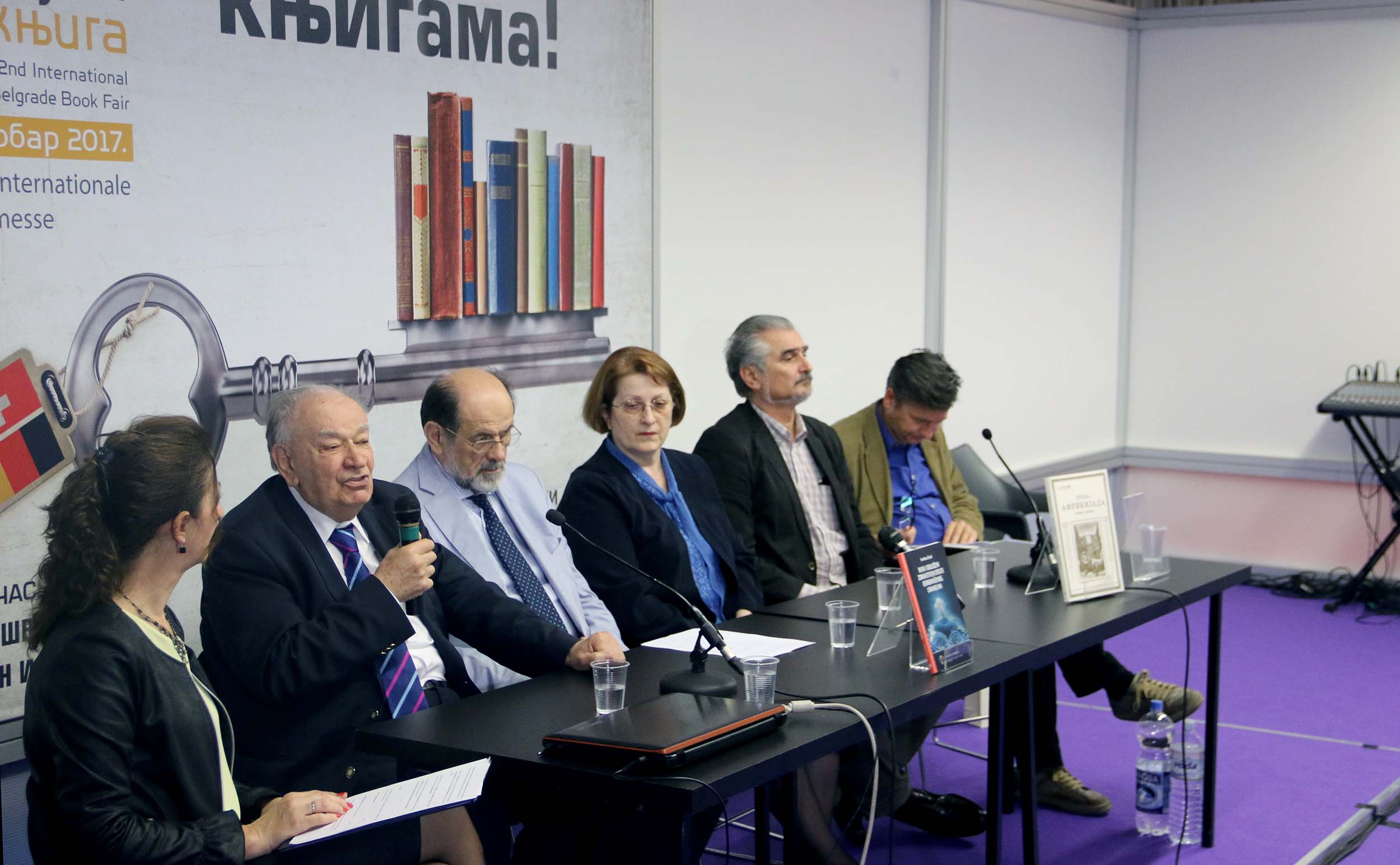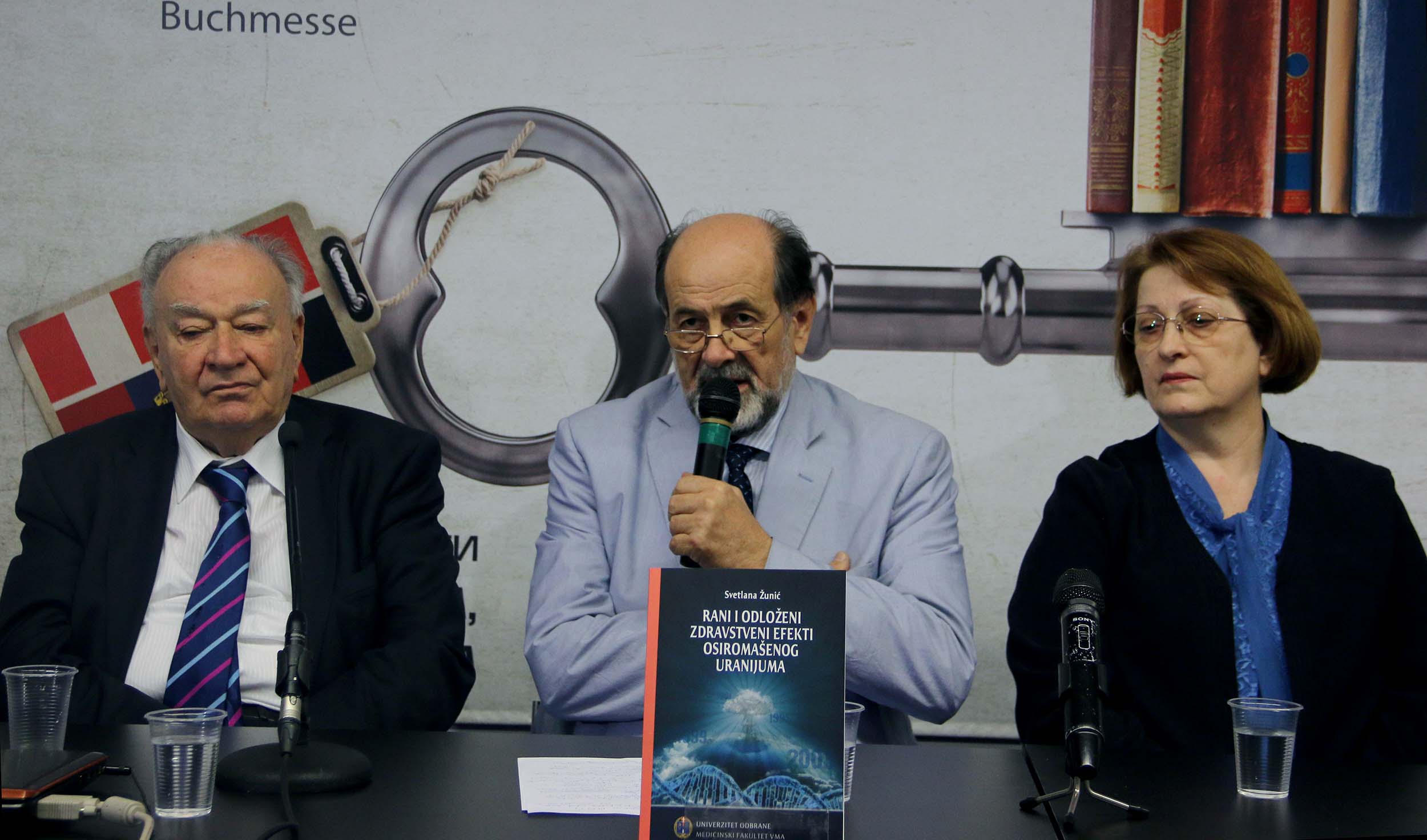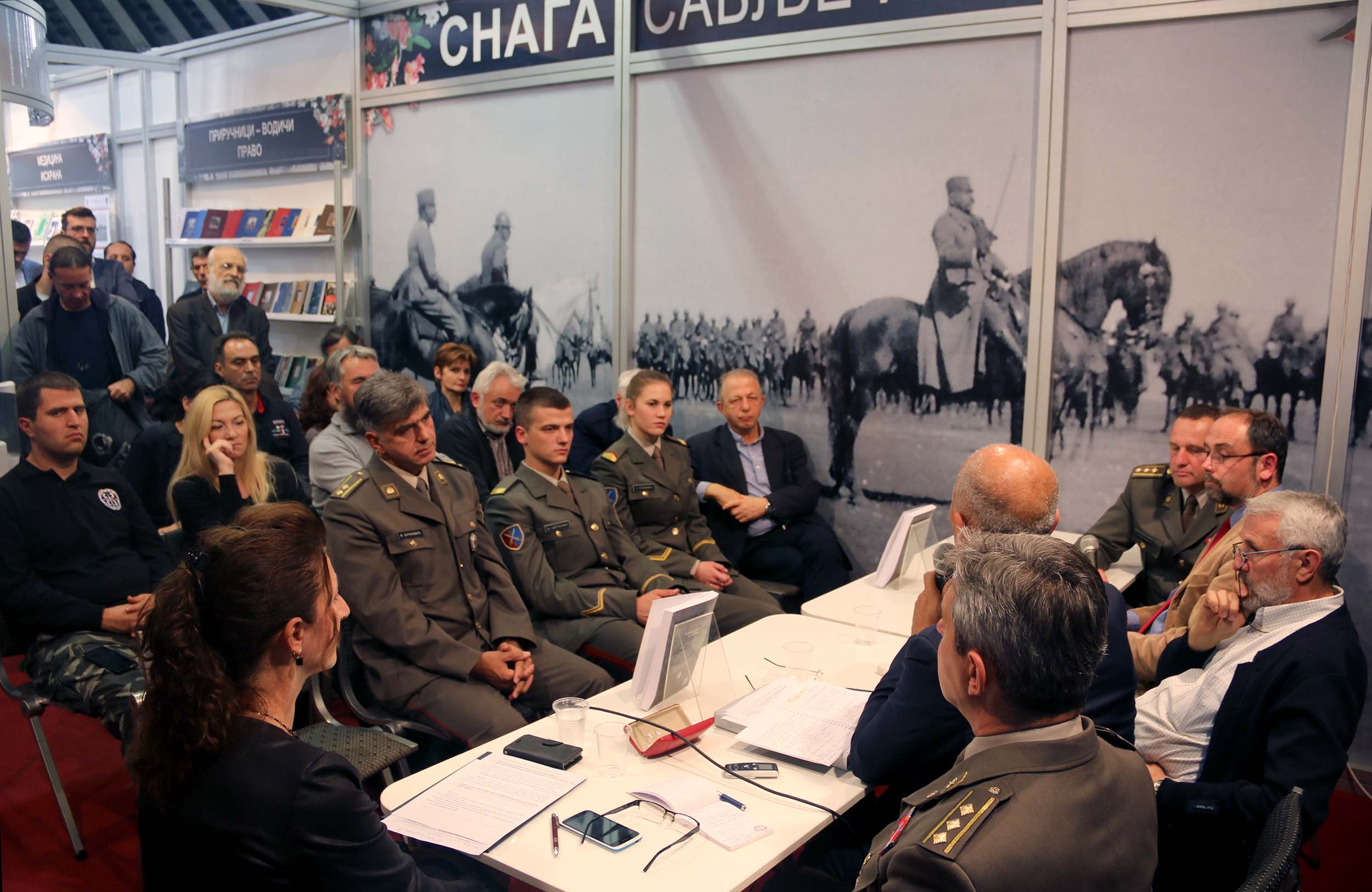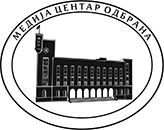28.10.2017
Book Fair Chronicles, Day 6
Book Presentation
Small nations in great conflicts – brilliant episodes of our countrymen, a response to political revision of history and depleted uranium.
 Following a decision to use its publishing activity to shed light on topics less familiar or rarely represented in our nonfiction and science, the Media Centre “Odbrana” has prepared three important works within this year’s opus and presented them today. These are “Early and Postponed Effects on Health of Depleted Uranium” by Professor Dr Mirjana Žunić, doctor at the Clinical Centre of Serbia and a guest lecturer at the Military Medical Academy, “Serbian Africiade” a collection of cultural history of our military in the North Africa during the First World War, and “The Road to Sarajevo”, of the British historian John Röhl. The last two books were published in collaboration with the publishing house “Klio”.
Following a decision to use its publishing activity to shed light on topics less familiar or rarely represented in our nonfiction and science, the Media Centre “Odbrana” has prepared three important works within this year’s opus and presented them today. These are “Early and Postponed Effects on Health of Depleted Uranium” by Professor Dr Mirjana Žunić, doctor at the Clinical Centre of Serbia and a guest lecturer at the Military Medical Academy, “Serbian Africiade” a collection of cultural history of our military in the North Africa during the First World War, and “The Road to Sarajevo”, of the British historian John Röhl. The last two books were published in collaboration with the publishing house “Klio”.Mirjana Sandić, the editor of these titles, said that the problem of depleted uranium was just emerging as a topic in the world and particularly here: “Owing to the use of this ammunition in Iraq and the Balkans, this book could also have been titled “4x4” since this ammunition has been used at least four times in four war conflicts. It is certain that a silent assassin is on the scene, a Trojan horse of nuclear war”.
Expressing gratitude to the author and publisher for their courage to deal with this topic which is, according to his belief, accompanied by a long-term cover up, Academician Ljubiša Rakić said that it was thought for too long that the consequences of the bombardment using this ammunition were local in their character which was not true:
“The effects proven here by Professor Žunić have two segments – direct one and the long lasting one that covers great distance. After the Gulf and Balkan wars, the level of radiation was increased at great distances. The depleted uranium does not instantly have significant consequences like the ones in Hiroshima and Nagasaki, but its small doses, that are everywhere, effect changes in living organisms, and their effects increase multiply in the future. We have to turn to the future, and the science should answer the question of how to protect ourselves. Of course, the tabloid approach to this problem is not good, and only the scientific one can be taken into consideration”.
Dr Đuro Koruga, the second reviewer of this book, said that its backbone was the consideration of the effect that had been noted back in 1972 by Canadian scientist Ted Haugh: “Small doses have a greater effect in the long run. Concurrently, this is something over which battles are fought when it comes to depleted uranium. The effects have to be measured and the topic is thereby more important sinve today the smaller scale local nuclear wars cannot be excluded”.
This interesting book, according to the author, was being created during the period of seven years of creative work with the students of medicine at the MMA and, in it, the author tried to present the early consequences of the effects of this ammunition: “It turned out that the multisystem and multi-symptomatic effects of the ammunition with this charge – the occurrence of certain cells in an organism as the first defence of the body, over a period of many years that follow the contamination, appear as inflammatory conditions which slowly lead to a tumour”. Professor Žunić is confident that the solution will be to find markers that would quickly indicate a possible occurrence of the disease caused by this effect, as well as prenatal diagnostics, adding that the society needs to respond responsibly and deal with this in a truly expert manner.
 Zoran Hamović, Director and Editor of the publishing house “Klio” with which “Odbrana” published the other two presented books could not but talk about the topic dealt with by Professor Žunić, using it, at the same time, as a kind of pretext for the presentation of the “Serbian Africade” and “The Road to Sarajevo”.
Zoran Hamović, Director and Editor of the publishing house “Klio” with which “Odbrana” published the other two presented books could not but talk about the topic dealt with by Professor Žunić, using it, at the same time, as a kind of pretext for the presentation of the “Serbian Africade” and “The Road to Sarajevo”.“The previous topic is extremely important and has to be visible to our society. At the same time, it is linked to the “Serbian Africade” and the book by John Röhl “The Road to Sarajevo” – it represents a difficult, recent past which we do not like, and the latter two represent a difficult and tragic past that we love.“
Hamović says that both “Serbian Africade” (a reprint of the book from 1922) and “the Road to Sarajevo” are a look back into the memories of what is very important for Serbian culture, but it is also a try to clarify our relation towards the past:
“After the withdrawal, 60 000 of our countrymen found themselves in North Africa, especially around Bizerte. There they showed how one such and so large a military can function and turn one difficult moment in not only physical but also spiritual revival which later led them to the brilliant victory. Since, in Bizerte, there were symphonic orchestras, poets, painters, and there was a living cultural activity which brought people back with their identity restored to health. There, on the position zero, our people said “No, we still exist”. And they came back. That is “Serbian Africade”, a testimony to that”.
Presenting the third book “The Road to Sarajevo” by John Röhl, Hamović emphasized that those were the essays of a great historian in which he yet again pin pointed the ones responsible for the outbreak of the First World War, and responded to all the attempts at historical revisionism in service of current politics:
“There is no and there cannot be a revision, and John Röhl openly opposed those attempts. Our relation towards such past has to be adamant”.
Historian Miloš Ković, could not but to look back on the first presented book, speaking about the need of our nation to stop having illusions about the others, not allowing spinning to determine our position about ground breaking events, even if the winners of great awards such as the Nobel prise are involved. For him, the results of the research done by John Röhl are the sufficient indicator:
“Röhl was an associate of Franz Fisher and as such, absolutely sure of German responsibility for the outbreak of the war. He came into possession of a journal of Admiral Miller which contains minutes of the War Council in Potsdam in 1912 in which Tsar Wilhelm participated, when it was unequivocally concluded that Germany must go to a war. Röhl obtained other documents as well which backed up the Miller’s notes. The cause was Austrian and Serbia conflict regarding Albania, and the access of Serbia to the coastline through northern Albania.
Public discussion – Military Ethics – Written in People and Books
 On the last but one day of the Book Fair, the final, sixth public discussion was held during which the Ministry of Defence and Media Centre “Odbrana” presented themselves to the public at the Fair. The minister of defence initiated the organisation of these public discussions, and the discussions, as the Director of the Media Centre “Odbrana” said, were derived one from another, and attracted the public attention. And the link between the last but one discussion about military neutrality and today’s discussion were the words of Minister of Defence Aleksandar Vulin about the necessity to differentiate between good and evil. The title of today’s public discussion was “Military Ethics – Written in People and Books”.
On the last but one day of the Book Fair, the final, sixth public discussion was held during which the Ministry of Defence and Media Centre “Odbrana” presented themselves to the public at the Fair. The minister of defence initiated the organisation of these public discussions, and the discussions, as the Director of the Media Centre “Odbrana” said, were derived one from another, and attracted the public attention. And the link between the last but one discussion about military neutrality and today’s discussion were the words of Minister of Defence Aleksandar Vulin about the necessity to differentiate between good and evil. The title of today’s public discussion was “Military Ethics – Written in People and Books”.The mediator of the public discussion, Mirjana Sandić, an editor in Division for Publishing Activitiy, pointed out in her introduction that freedom-loving and the love for the military are interwoven in the tradition of Serbian people.
“The military has always brought the spirit of honour and humanity into combat, and afterwards it was transmitted from generation to generation through prose and poetry to descendants. Such experiences are also recorded in books endorsed by the Media Centre “Odbrana” – Sandić said and stressed that a particular attention was paid to the nonfiction dealing with the history of the military, through memoirs, war journals of great military leaders. We are talking about more than 30 books about the First World War which depict moral values of a Serbian soldier.
The ones who have so far and in different ways dealt with the issues and problems of the military ethics spoke at the public discussion about those values. The persons in question are Professor Jovan Babić, professor of Ethics at the Faculty of Philosophy of the Belgrade University, visiting lecturer at the Military Academy where he teaches Military Ethics, Professor Borislav Grozdić, retired Colonel who founded and taught Military Ethics at the Military Academy, Colonel Stevica S. Karapandžin, one of developers of the Code of Honour for the members of the Serbian Armed Forces, today the Director of the Media Centre “Odbrana”, Colonel Srećko Kuzmanović PhD, Head of Section for Moral, Culture and Tradition in the Human Resources Department (J-6) of SAF GS and Dr Aleksandar Stevanović from the Faculty of Law for Economy and Legislation in Novi Sad.
At the public discussion, they presented their positions and messages about the ethics of military profession, the role of moral in building an individual and the military.
At the beginning of the public discussion, Professor Jovan Babić delineated the difference between the notions of ethics and moral and pointed out that the ethics is a theory of moral and that moral is reality.
“It is very important for officers to know the theory of moral, to be trained to more aptly raise moral dilemmas, to be trained to think quickly and resolutely and make decisions bravely, but, they also need to convey, not only by providing an example but with their explanation as well, what is morally right and what is not, what should and what should not be done, what can and what must not be done, what is useful and what can be harmful – Professor Babić explained.
 He underlined that the Military Ethics is very important subject at the Military Academy and that the officers should be trained in that field, and in ethics in general, and in other areas as well, because they could need all of that in some critical situations and in time of peace as well. At the same time, moral is something that is important for their work with soldiers afterwards in the units.
He underlined that the Military Ethics is very important subject at the Military Academy and that the officers should be trained in that field, and in ethics in general, and in other areas as well, because they could need all of that in some critical situations and in time of peace as well. At the same time, moral is something that is important for their work with soldiers afterwards in the units.Retired Colonel, Professor Borislav Grozdić spoke about the times when moral had been banished from the military, the time when not even a rulebook for building moral could be passed, when the bodies in charge of moral had been abolished. He also talked about the reasons why the name of the subject at the Military Academy had been changed. One of them was to make it compatible with similar subjects in other militaries, and the other was to avoid sneering at the world moral. Military ethics was more acceptable. Moreover, there was a long way to introducing the subject as obligatory at the Military Academy.
“At first it was an optional subject, although three things are required from an officer – to be proficient in the field they are prepared for, to be physically fit and have a high moral.
Colonel Srećko Kuzmanović said that the position was changing in recent years regarding the need for moral in the military and announced that starting from that year moral education was going to be reintroduced. The members of the Ministry of Defence and Serbian Armed Forces talk about it more and more often. He stated that they used to have different views. It was thought that moral was a communist-socialist creation, but he disputed that, as he pointed out, showing in his recent discussion with decision makers the Service Rules from 1925 which consisted of 365 pages, where the first third of the document and the first chapter are titled Moral. Colonel Kuzmanović then talked about the restoration of the instructions on moral.
According to the words of Dr Aleksandar Stevanović a society which loses its moral is the most difficult to recover. That was seen in the 90’s of the 20th century. Then, the moral was lost. He says that this time has passed and that we are on the road of moral restoration. And the public discussion was supporting that claim.
Another topic of the public discussion was the Code of Honour and the values that it contains, and whether it has always been a feature of the Serbian military and how it is implemented.
Colonel Stevica S. Karapandžin, one of developers of the Code of Honour for the members of the Serbian Armed Forces, explained why it was required to codify the behaviour of the members of the military profession.
“We live in the 21st century. In the past, it was enough for the people to guide themselves by standard norms. Today, it is necessary to standardise it. That is why the behaviour is codified in many militaries of the world because today, it is impossible to regulate the ethics of soldiers by professional rules. The code is introduced in order to oversee, enhance and promote sensitivity regarding professional, ethical and personal values that are specific to the military profession. The Code of Honour fosters and cherishes and develops the most valuable Serbian military traditions Apart from the Constitution, law, bylaws, it is legally binding. How is it achieved? –Through command, training, control and especially through educational work of superior officers. The Code of Honour does not rest on punishment but on educational component-Colonel Karapandžin underscored.
Professor Grozdić reminded that after passing the Code of Honour, the members of the military were obliged to carry it in the left pocket of their blazer and it became a rule. Upon adopting the Code, the Military Academy produced the Code of Honour for Cadets.
It is one thing to carry the Code of Honour in your blazer, and the other to apply it, and moral is very difficult to develop – Colonel Kuzmanović said. He asked why we have to fight for moral and answered that the person who neglects moral certainly did not manage to complete the mission, or he has not completed it in a quality fashion.
A segment of the public discussion was dedicated to the relation between moral and religion, and the participants talked about what can be considered as holy, and about the holy values that should be preserved. Also, some examples of the relation between moral and courage were given, as well as the quotes of famous war leaders. They also talked about humanity, holiness, relation to war and behaviour in it, and about the humane quality.
- Humanity is one of the most valued human features. One cannot be a hero if one is not a human at the first place – Colonel Karapandžin said pointing out that there were countless examples of humanity of soldiers from the First World War. – All it takes is to go to the island of Corfu and go to the church of St. Spiridon Trimitunski on Sunday and if a group of Serbs sings “Tamo daleko” it will be easy to understand the meaning of the legend, transmitted from generation to generation about the Serbian military.
At the end of promotion Director of the Media Centre “Odbrana” instanced what a Christian soldier should be like quoting the words of Ivan Iljin.
- That Russian religious philosopher says that not everyone is capable of holding the sword and fighting with it, nor surviving his spiritual mission in that fight. “This does not require the worst, but the best people who within themselves bring together nobility and power, because the weak cannot carry that burden, and the wicked will fail the task using their sword”.
“Zastava Film” at the Fair
Victories on unknown terrain and the terrain cannot be known if there is no knowledge about its characteristics, and if it is not mapped. That is why sometimes, at the time of Henry VIII and other great rulers, cartographers were highly exclusive individuals and their skills were rewarded by immense quantities of gold. This is the reason why this scientific field in the Serbian Armed Forces was presented in the film “Military Geography Institute over three centuries” on the last but one day of the Fair. Saturday on the Fair was the opportunity to see and hear what and who helped detecting and shooting down the “invisible” plane. One could learn that in 1999 just one of the numerous radars of our armed forces was hit 11 times but despite that its operators did not allow bombing to distract them in defence of their country. Also, one could learn that during those several tragic months, by night, in just one segment of our sky, there had been up to 200 enemy planes. All of that was given in the “War Journal of the 126th Brigade for Air Surveillance Early Warning and Guidance” which then demonstrated its war skills. The last but one day of the Fair was an opportunity for this renowned film house to present what it did in the previous year.

